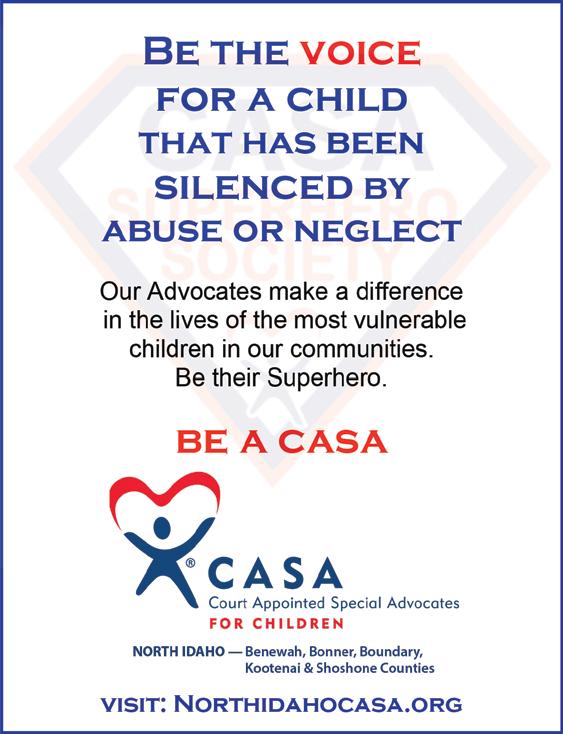
15 minute read
Gum Disease and Heart Disease: The Common Thread

by Brett Matteson, DDS, FACP, DABP, Lakeview Dental Clinic
Advertisement
How plaque on your teeth may be connected to plaque in your arteries
For decades, researchers have probed the link between gum disease and cardiovascular health. Gum disease begins when the sticky, bacteria-laden film dentists refer to as plaque builds up around teeth. A completely different type of plaque — made of fat, cholesterol, calcium, and other substances found in blood — can build up inside arteries. Known as atherosclerosis, this fatty plaque is the hallmark of coronary artery disease.
People with gum disease (also known as periodontal disease) have two to three times the risk of having a heart attack, stroke, or other serious cardiovascular event. But there may not be a direct connection. Many people with heart disease have healthy gums, and not everyone with gum disease develops heart problems. Shared risk factors, such as smoking or an unhealthy diet, may explain the association. Still, there’s a growing suspicion that gum disease may be an independent risk factor for heart disease.
Periodontal disease increases the body’s burden of inflammation. Acute inflammation — which involves an outpouring of immune cells that attack irritants and microbial invaders — fosters healing over the short term. But long-term (chronic) inflammation is a key contributor to many health problems, especially atherosclerosis.
To date, there’s no proof that treating gum disease will prevent cardiovascular disease or its complications. But the connection is compelling enough that dentists (and many doctors) say it’s yet another reason to be vigilant about preventing gum disease in the first place.
Daily tooth brushing and flossing can prevent and even reverse an early stage of gum disease, known as gingivitis. If your dentist says you have gingivitis, ask for a brushing and flossing demonstration to make sure you’re doing both correctly. I did not know this as a dentist until I was in dental school and had many classes on Hygiene. Many people don’t spend enough time or care when brushing (the recommended duration is two minutes). Flossing sweeps away the sticky film between teeth that leads to plaque buildup. Twice-yearly cleanings by a dentist or hygienist are also advisable.
Left untreated, gingivitis can turn into periodontal disease (see “Signs of gum disease”). The gums become loose around the root of the tooth, creating a gum pocket that gradually deepens. Eventually, the infection and inflammation can cause the tooth to loosen and possibly fall out.
Signs of gum disease
Any of these signs can be a clue that you have periodontal disease: • swollen, red, or tender gums • gums that bleed easily • pus between the teeth and gums • bad breath • buildup of hard brown deposits along the gum line • loose teeth or teeth that are moving apart • changes in the way dental appliances fit
Periodontal Disease in Men
PROSTATE HEALTH
Prostate-specific antigen (PSA) is an enzyme created in the prostate that is normally secreted in very small amounts. However, when the prostate becomes inflamed, infected, or affected by cancer, PSA levels rise. Research has shown that men with indicators of periodontal disease such as red, swollen or tender gums as well as prostatitis (inflammation of the prostate) have higher levels of PSA than men with only one of the conditions. This means that prostate health may be associated with periodontal health, and vice versa.
HEART DISEASE
Research indicates that periodontal disease and cardiovascular disease are associated; having periodontal disease may actually increase your risk of cardiovascular disease. Both diseases are chronic inflammatory conditions, and researchers believe that inflammation is the connection between gum disease and heart disease. Since men are already more likely to develop heart disease than women, maintaining periodontal health is another way to reduce this risk.
IMPOTENCE
Men with periodontal disease, especially those younger than 30 or older than 70, are at increased risk of developing impotence, according to research. Researchers believe that inflammation may be the link between the two conditions; prolonged chronic inflammation (the same type of inflammation that is associated with periodontal disease) can damage blood vessels leading to impotence.
CANCER
Research has found that men with a history of gum disease are 14 percent more likely to develop cancer than men with
healthy gums. Specifically, men with periodontal disease may be 49 percent more likely than women to develop kidney cancer, 54 percent more likely to develop pancreatic cancer, and 30 percent more likely to develop blood cancers.
Periodontal Disease in Women
PUBERTY
During puberty, an increased level of sex hormones, such as progesterone and possibly estrogen, causes increased blood circulation to the gums. This may cause an increase in the gum’s sensitivity and lead to a greater reaction to any irritation, including food particles and plaque. During this time, the gums may become swollen, turn red and feel tender.
MENSTRUATION
Occasionally, some women experience menstruation gingivitis. Women with this condition may experience bleeding gums, bright red and swollen gums and sores on the inside of the cheek. Menstruation gingivitis typically occurs right before a woman’s period and clears up once her period has started.
PREGNANCY
Some studies have suggested the possibility of an additional risk factor – periodontal disease. Pregnant women who have periodontal disease may be more likely to have a baby that is born too early and too small. However, more research is needed to confirm how periodontal disease may affect pregnancy outcomes.
All infections are cause for concern among pregnant women because they pose a risk to the health of the baby. The Academy recommends that women considering pregnancy have a periodontal evaluation.
MENOPAUSE AND POSTMENOPAUSE
Women who are menopausal or post-menopausal may experience changes in their mouths. They may notice discomfort in the mouth, including dry mouth, pain and burning sensations in the gum tissue and altered taste, especially salty, peppery or sour.
In addition, menopausal gingivostomatitis affects a small percentage of women. Gums that look dry or shiny, bleed easily and range from abnormally pale to deep red mark this condition. Most women find that estrogen supplements help to relieve these symptoms.
A board-certified prosthodontist can help with all of your dental needs while ensuring optimal outcomes. To learn more about the scope of our services, go to our website: LakeviewDentalClinic.com.
Resources American Academy of Periodontology. Gum Disease and Women. www.perio.org 3/3/21 American Academy of Periodontology. Gum disease and Men. www.perio.org 2/3/21 Harvard Heart Letter. Gum Disease and heart disease. www.health.Harvard.edu/ heart-health
After graduating from dental school, Dr. Brett Matteson was accepted into the United States Army’s “Advanced Education in Prosthodontics” program. It was Dr. Matteson’s honor to treat our soldiers around the world, and it is now his privilege to treat the community of Coeur d’Alene and surrounding areas, including Post Falls and Hayden Lake. Dr. Matteson is an active member with the Idaho State Dental Society, and is the Vice President of the Idaho Panhandle Dental Society.

Over this past year, CASA has been creative in our grant writing and have had the opportunity to work on some “out of the box” ideas with donors on different service needs for our CASA children. The CASA Learning Lab was established through a living trust from a married couple on their 35th wedding anniversary. They both have a passion for education, so wanted to make an impact on children through tutoring. We now have an endowment over the next 10 years to provide tutoring services for school aged children.
The development of our Project Permanency grew out of a need to provide basic household essentials for reunified families. Furniture to help instill family activities and normalcy, such as a kitchen table or refrigerator. Beds for every child to feel like they are worthy of their own space and have something to call their own. We are thankful that we have the resources and the revenue to be able to provide these extended services to our CASA children. We are excited to be able to support local stores, such as Sandpoint Furniture when purchasing these essentials for our deserving families.
CASA helps children overcome the trauma they have experienced and to provide hope for a better future. Whether reunification with the biological family or adoption into a new family, that is CASA’s goal for a child, CASA serves the whole family. Through Project Permanency, CASA works to support family connections, aid in the process of releasing shame and helps to build stable relationships within the nuclear family. In addition to recommending services to the Court, CASA can provide basic needs and supplies as well as, critically needed items that help develop a healthy and stable home environment.
The benefits of a stable home extends far past furniture
CASA has many tools and resources to help families build trust, relationships and connections and ease the transition into new homes, both emotionally and financially. CASA builds the foundation for permanency success. Through a formal application process, CASA tracks families and purchases. Funds received and expended are recorded on the monthly financial Statement of Activity. CASA strives to build capability within these families and homes, not dependency. Our goal is to encourage the betterment of parents’ lives and the children they care for.
All children CASA serves are eligible to receive basic needs and supplies: toiletries, diapers and baby supplies, clothing, books, comfort toys, blankets, snow and beachwear, and gift cards for clothing, gas, and food. CASA provides additional tangible goods
CASA Has Two New Programs! CASA Learning Lab & Project Permanency

by Kristin Ludwig, Director of Development, North Idaho CASA
Kristin Ludwig, Director of Development, and CASA team member has over 20-years experience in event planning, advertising and marketing. After moving to Coeur d’Alene in 2005, she became involved in local volunteer organizations and political campaigns, advocating for the good of the community. She has worked with the Coeur d’Alene Backpack Program since it’s inception and was lead planner on Wine, Women & Shoes for Idaho Youth Ranch.
to families demonstrating resiliency and courage to repair their lives and provide stable homes for their children. CASA provides beds, dressers, mattresses, car seats, swing sets, and bicycles. Examples of additional items provided during 2020 include a washer, dryer, and deep freezer for a single father of eight children (three of which are foster children); snow tires on a family’s only vehicle; car repair, and a refrigerator for a single mom; new carpet and window treatments for a trailer home; and a deck for a tiny house giving the kids more room to play.
Adoptive parents are also eligible to apply for the Project Permanency program. As with reunification with biological families, adopting a child into a family is a new beginning. This process deserves all the same encouragement and support to help the family build a healthy and permanent home.
In addition to breaking the cycle of abuse, we strive to provide hope, encouragement, and pride for families trapped in generational poverty. Poverty can make people feel they are deficient. Poverty impacts motivation, expectations, learning, relationships, and communication. We empower individuals to thrive rather than survive. Envision the pride instilled in providing a bed for a child who usually sleeps on the floor or new clothes to a child who has only worn hand-me-downs. Partnering with these biological and adoptive families helps set parents up for success.
When a CASA works towards reunifying a family, the family has been under the Child Protective System purview for at least several months or even years. The family is well known and understood by the CASA advocate, the Court, the social worker, and service providers. The family has demonstrated compliance with the terms of their case plan and completed the court-ordered tasks in order to be reunified with their children. These tasks may include providing safe housing, being employed, attending parenting classes, participating in counseling, and performing drug and alcohol testing. At this stage of a child protection case, the IDHW, CASA, and the District Courts are working together to reunify the family and coordinate services. In most cases, the difference between the path to successful permanency, or financial and emotional turmoil, can be as simple as having a drivable car or a working refrigerator.
The National CASA/GAL (Guardians ad Litem) Association (founded in 1977) and North Idaho CASA (founded in 1993) have proven records of positive outcomes. CASA is mandated and accountable to both the Idaho Supreme Court and National CASA. The program has a successful history of raising funds from the generous contributions of state and federal agencies, foundations, individuals, and businesses in our community. If you would like to become a donor to Project Permanency, please visit our website: www.northidahocasa.org to learn more.

Bonner General Ophthalmology Getting to Know Dr. Torres
Career Veteran, Medical Professional, and why he chose Bonner General Health for his next adventure.
by Kristin Carlson, Marketing Specialist, Bonner General Health

Ophthalmology was a service line missing from Bonner & Boundary County since the retirement of Dr. Charles George, in 2017. Bonner General Health recognized the need and planned to add this specialty service to its umbrella of clinics. The robust recruitment efforts paid off when Dr. Mark Torres from Tacoma, Washington, moved to Sandpoint and joined our team. The clinic was slated to open in February 2020 but was halted by the COVID pandemic. Dr. Torres and his team hit the ground running as soon as the clinic opened in May and has proven to be a vital and essential service to our community.
I sat down with Dr. Torres to allow the community to get to know him and see just why Bonner General Ophthalmology is a success.
1. What is your favorite thing about living in Sandpoint/
Bonner County?
I grew up in a town very similar to Sandpoint - a small town in the Rocky Mountains. Sandpoint and Bonner County remind me of all the things I cherished from that upbringing. Friendly people saying “hello” when they pass you on the sidewalk and are always interested in pausing for a brief “catch-up” chat. Folks who are resilient, responsible, and independent in all aspects of life, yet never hesitate to reach out and assist a neighbor in need. People with a bond to the outdoors and all the beauty and adventure that entails. They wake up every day, look outside their windows at a mountain paradise, and head out to live life as it was meant to be lived.
2. You have traveled and lived in many places throughout your career. What is a unique place you have lived in, and what did you like about it?
Germany was my favorite military duty location, really for the same reasons as Sandpoint and Bonner County. I lived in a small German town, where the people were very hospitable and practical. Even though I was a foreigner, they were always courteous and friendly and always willing to help out an “outsider” who may not be wise to their unique customs, traditions, and routines. On this personal level, they were not much different than other folks around the world.
3. What motivated you to join the military? Is your military career what led you to a path in the medical field?
There are few reasons behind my military background. My father was a career Air Force person, and I very much respected and admired him. He never pushed me toward military service, only highlighted the opportunities that military experience can sometimes bring. Of course, nothing is guaranteed; you still have to put in the work. Also, the military offered a financial pathway and means to fund college and medical school, a common reason many individuals consider military service. Regarding my medical career, I was interested in scientific pursuits at a very young age. Along the way, those interests remained solid and unchanged, and a career in the medical field became the best fit for my goals and aspirations.
4. How did your military experience affect your life and career today?
I came away from my military service with many life lessons and tools that you can acquire from military experience; self-discipline, self-confidence, and selfreliance in everyday tasks and pursuits. Also, respect for all individuals from widely diverse backgrounds and widely different life and career paths and interests. The functioning as part of a wellorganized and successful team and the teamwork necessary to make it happen. The ability to move on in life when your “run is done,” with an outlook that other unique and wonderful life experiences are on the horizon. Just like my experience with Sandpoint, Bonner County, and Bonner General!
5. What are some of the honors you are most proud of in your career?
I’m honored to have had the privilege to serve in the US military. Working side-byside, for so long and so successfully, with so many talented and passionate individuals from diverse backgrounds and exciting places, is something I’m exceptionally proud of. I’m honored to have had the opportunities and experiences along the way and shared those with others. I’m honored to be an American. We’re not perfect, but our country is grounded in solid principles and ideals, and many places in the world are not so fortunate. I’m honored to have visited other places globally and have interacted with people of different cultures and traditions. At the individual level, their goals, dreams, and priorities are not much different than ours — freedom, family, opportunity. I’m honored to have been able to serve in a medical profession that ultimately benefits others. Lastly, I’m honored to have the chance to continue that medical profession at Bonner General Health!

Dr. Torres specializes in corneal and refractive surgery, diagnosis and treatment of conditions, injuries, and diseases related to the eye. Bonner General Ophthalmology is the only ophthalmology clinic in Sandpoint and the surrounding area. The clinic is located at 423 N. Third Avenue in Sandpoint. (208) 265-1011, bonnergeneral.org.
Kristin Carlson holds a Bachelor’s Degree in Public and Interpersonal Communication from North Carolina State University. She joined the Bonner General Health team in March 2020. Before BGH, Kristin worked as the Communications and Tourism Specialist for the Greater Sandpoint Chamber of Commerce and has experience in Project Management, Recruiting, and Administrative Roles. Her goal is to ensure individuals living in or visiting our community are aware of the exceptional care, providers, and services available at BGH.











